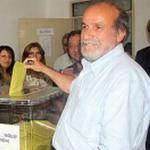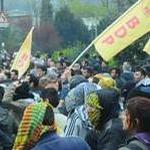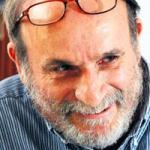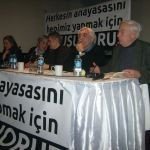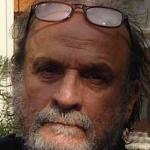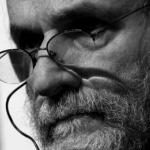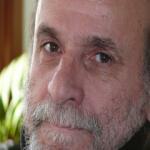INTERVIEW WITH ERTUĞRUL KÜRKÇÜ - PART 1
"Labour, Democracy and Freedom Block must be Continued"
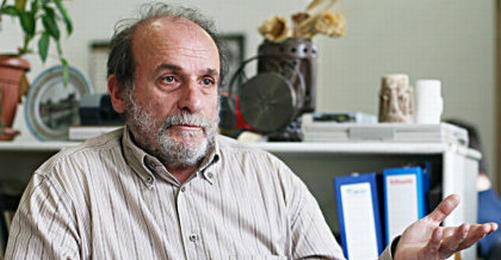
Ertuğrul Kürkçü is the nominated candidate for Member of Parliament for Mersin (eastern Mediterranean coast) of the Labour, Democracy and Freedom Block. The Labour, Democracy and Freedom Block is supporting the Peace and Democracy Party (BDP) for the general elections in June this year. Kürkçü sees himself as a representative of labour rights in parliament. In his opinion, the possibilities for a concrete and effective peace project and also for the demands of the labour movement can be increased by giving voice to them on a higher level.
"We are not talking about the struggle to broaden an alternative group in parliament; what we are talking about his the struggle to transform Turkey. This block has to be continued by broadening and deepening its composition", Kürkçü said. Therefore, he emphasized the importance of the active participation of trade unions, Alevi movements and women organizations in this process.
Kürkçü described his candidature as member of parliament as "a job that needs to be done". He explained, "The crucial point is to always continue to pass on the word of socialism".
"If I can do that properly, then this time I serve the general objectives of my life on these grounds".
63-year-old Kürkçü is the Secretary General of the İPS Communication Foundation and the Coordinator of the BİA Project. He studied architecture at the Middle East Technical University (ODTÜ) in Ankara where he chaired the ODTÜ Socialist Ideas Society. In 1970, he was elected the General President of the Federation of Turkish Revolutionary Youth Associations (DEV-GENÇ).
Kürkçü was one of eleven young revolutionists who tried to rescue Deniz Gezmiş, Yusuf Arslan and Hüseyin İnan, members of the Turkey's People's Liberation Army (THKO) who were sentenced to death penalty by the Ankara Martial Law Court after the military coup on 12 March 1970. Kürkçü was the only one who survived the operation at the Kızıldere village in the Niksar district of Tokat. The Martial Law Court sentenced him to death penalty. Kürkçü served 14 years in prison before he was released in March 1986.
Between 1986 and 1988, he was the editor and translator of the Encyclopaedia Britannica. We worked as an author and publication director of the Encyclopaedia of Socialism and Social Struggles. He contributed to the foundations of the Özgür Gündem ('Free Agenda') and Evrensel ('Universal') newspapers and worked as a writer for the Yeniden Özgür Gündem ('New Free Agenda') newspaper.
What will be the response in Turkey to an effective representation of the BDP's axis of labour rights?
"We are talking much more about a block than about the BDP. The Labour, Democracy and Freedom Block. It runs for the elections within the Turkish socialist movement and the Kurdish national movement, outside of the BDP, constituted of other elements than the BDP. So the evolving picture shows more the alliance of the oppressed and the labourers instead of the BDP. But of course, the BDP creates the vital point for it. Three important results will occur if this representation is being strengthened in parliament:
First, it means that the BDP will be strengthened in parliament and the Justice and Development Party (AKP) and the Republican People's Party (CHP) will be weakened accordingly.
Second, the possibility to communicate more intensely a concrete and positive project for peace will emerge.
Third, our say and visibility increases due to the alliance of the socialists with the BDP. Hence, there will be many more opportunities to make the voice and the problems of the labour movement heard on the highest level in Turkey.
The parliament is one of the grounds for our struggle. If there is no movement and life on the streets, in schools, in factories, and if this representation does not strengthen this life and movement, then it does not mean a thing in itself.
But to my knowledge, this union emerges from the contributing people, structures, surroundings and the people who are related to this base. In this aspect I believe that this will be the opportunity for a positive transformation". (NV/EÖ/VK)
Click here to read the second part of the interview.
Engineers Inspect Hasankeyf: Caves Damaged
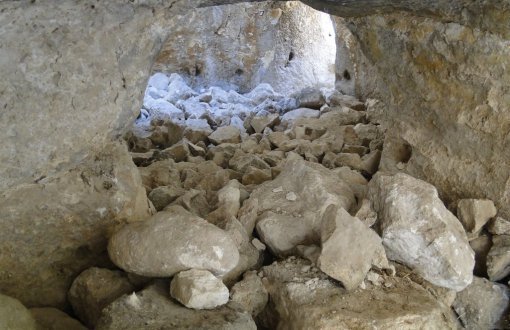
Sexual, Physical Violence Against People With Disabilities Increase

Villagers on Watch in Çanakkale Against Geothermal Power Plants
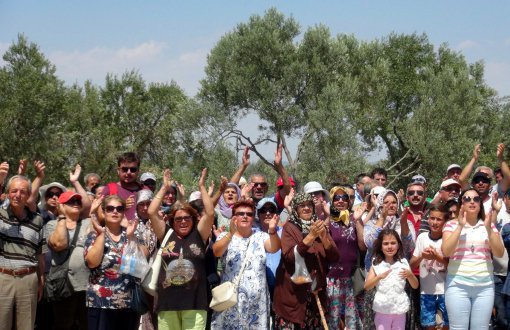
Judge Replaced Ahead of Summary Judgement in Soma Trial
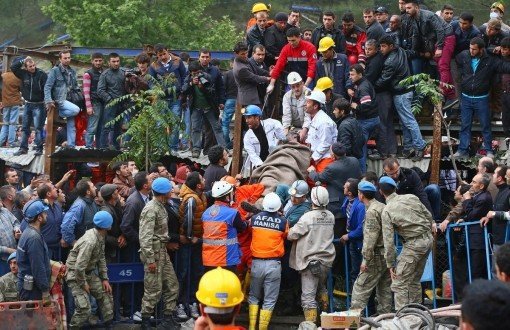
Most Miner Families Withdraw Complaint in Occupational Homicide Trial in Şirvan






